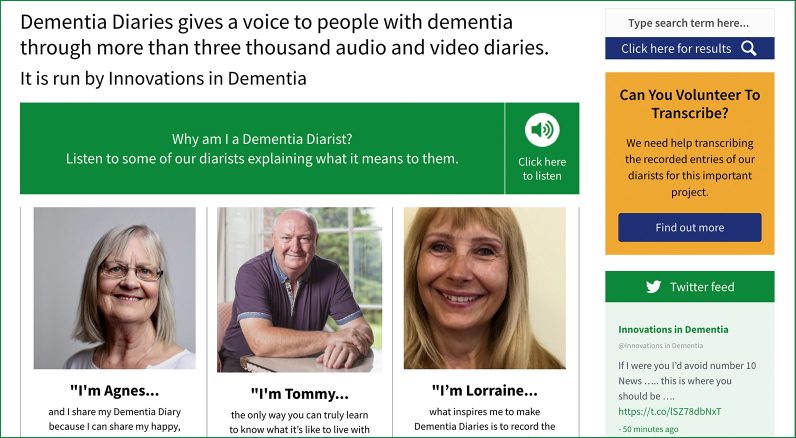One of the most powerful things we can do as human beings is to use our voices.
We use them to tell our stories, make our opinions heard, and to stake our place at the human table.
In the last decade or so, people are getting their voices heard more widely and more loudly than ever, largely due to social media.
One might argue that this is both a good thing and a bad thing. Everything we do in life has the potential to tip the world a little towards good, or a little in the other direction. Social media provides ample opportunities for both.
Either way, the extent to which our voice is heard is often a marker of our status, of our ability to shape our world and of our right to a place within it.
For many, the onset of dementia can mark a sudden change in the way their voice is heard.
Dementia can of course make it more difficult for people to express themselves. But voices are hushed and dampened by factors that go well beyond the physical impairment of brain function.
There remains a widely-held assumption that people with dementia are unable to have their say, and that others must therefore speak for them, or about them.
Many carers do an outstanding job of supporting people with dementia to articulate their thoughts, especially when and if they begin to find communication more difficult.
However, it’s also true that people with dementia often feel that family members and friends step in too soon, or too early. While this may be with the very best of intentions, it can leave their voices diminished or unheard.
Older readers may recall the long-running BBC disability programme “Does he take sugar?’ It ran for 20 years, before coming off air in the 1990s.
The programme was focused on those with a physical, sensory or learning disability.
In 2022, asking the companion of someone using a wheelchair “Does he take sugar?” would seem to belong to another age.
Does this hold true for people with dementia? Hmmm…..…
Many people with dementia will have their own “does he take sugar” experiences, often on what seems like a daily basis.
It’s not all doom and gloom though. We have become more accustomed to seeing and hearing people with dementia telling their stories in the media, and in charity campaigns and publicity. Compared to even ten years ago, it would appear that people with dementia have found their voices in far greater numbers.
But very often these voices are part of someone else’s narrative or agenda, be that news editor, charity fundraiser or campaigner.
What about the raw, unedited voices of people with dementia, talking on their terms about what they want to talk about?
Dementia Diaries, which is relaunched this week after a major rebuild, gives that voice to people with dementia.
Since it was launched, it has amassed more than 3000 audio diaries from people with dementia. Unedited, raw, and very real.
The Diarists do talk about their experience of living with dementia, but very often they talk about anything but dementia. They talk about their day, they express their opinions on everything from politics to the arts.
The diaries give a unique insight into not just dementia, but the interior worlds of those living with it.
For this reason Dementia Diaries has served as a treasure trove of information and insight for educators, researchers, policy-makers and journalists.
……but most importantly, for others with dementia.
Dementia Diaries offers a window into the lives of people who have been living with dementia, in some cases for a very long time. For someone facing dementia in the early days, they are a brilliant reminder that life goes on in all its glorious technicolour variety.
Listen to this diary from Shelagh, who used Dementia Diaries to show someone recently-diagnosed a glimpse into life beyond diagnosis:
“You gave us hope.”
Indeed you did Shelagh, as does every single Dementia Diarist who shares their worlds with us.
During lockdown we started a weekly ZOOM for diarists. This has added another dimension to the project, and created an incredibly close, relaxed, supportive and welcoming group of people with dementia. The love in the room is palpable, and most times it’s a great laugh in the company of people who just ‘get’ each other in a way that few others can.
Dementia Diaries is part of our family of initiatives under the Dementia Voices banner, and one which we are immensely proud and privileged to be able to offer.
We want to reach out to even more people with dementia, to make sure that their voices are included and heard, and to help to change the way people think and feel about dementia.
As Tommy Dunne says:
“Dementia Diaries is very, very important to me as a person with dementia. Because if people can listen to real people with dementia speaking then it will go a long, long way to help stop people making the wrong assumptions about a person’s ability to communicate just because they have a diagnosis of dementia.
Listening to my peers’ stories actually allows me to draw strength from them when I’m feeling down. They also inspire and uplift me. Dementia Diaries is like having a friend that’s always on the end of the phone, always there with a story, the type only my peers can tell.”
Find out more about Dementia Diaries, how to become one, and how to volunteer as a transcriber here: www.dementiadiaries.org

